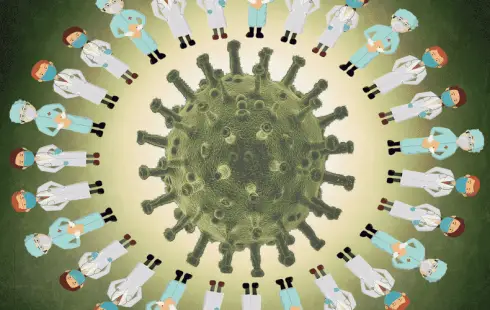
Fully Funded Scholarship Opportunity at the Bavarian International School for 2026-27
Section: News
 As the world continues to grapple with the COVID-19 pandemic, marked by its unprecedented global impact, societies are navigating a landscape shaped by progress, challenges, and enduring lessons. From the initial emergence of the novel coronavirus to the ongoing vaccination efforts and the evolving public health response, the journey through the pandemic has been fraught with uncertainty and resilience. In this comprehensive analysis, we explore the multifaceted aspects of the COVID-19 pandemic, shedding light on the progress made, the challenges faced, and the lessons learned along the way.
As the world continues to grapple with the COVID-19 pandemic, marked by its unprecedented global impact, societies are navigating a landscape shaped by progress, challenges, and enduring lessons. From the initial emergence of the novel coronavirus to the ongoing vaccination efforts and the evolving public health response, the journey through the pandemic has been fraught with uncertainty and resilience. In this comprehensive analysis, we explore the multifaceted aspects of the COVID-19 pandemic, shedding light on the progress made, the challenges faced, and the lessons learned along the way.
Progress in Vaccination Efforts
One of the most significant milestones in the fight against COVID-19 has been the development and deployment of vaccines on an unprecedented scale. Since the approval of the first COVID-19 vaccines in late 2020, millions of doses have been administered worldwide, offering hope for a path out of the pandemic. Vaccination efforts have played a crucial role in reducing severe illness, hospitalizations, and deaths, providing a glimmer of optimism amidst the ongoing challenges.
Global Collaboration and Scientific Advancements
The COVID-19 pandemic has underscored the importance of global collaboration and scientific advancements in addressing public health crises. From the rapid sequencing of the virus's genome to the development of innovative diagnostic tests and therapeutics, the collective efforts of scientists, researchers, and healthcare professionals have been instrumental in understanding and combating the virus. International cooperation through initiatives such as COVAX has facilitated equitable access to vaccines, highlighting the need for solidarity in the face of a shared global threat.
Challenges in Containment and Mitigation
Despite progress in vaccination efforts, the COVID-19 pandemic continues to present formidable challenges in containment and mitigation. The emergence of new variants, such as Delta and Omicron, has underscored the virus's ability to evolve and adapt, posing challenges to vaccine efficacy and public health measures. Additionally, disparities in vaccine distribution and uptake, coupled with vaccine hesitancy and misinformation, have hindered efforts to achieve herd immunity and control transmission rates in certain regions.
Socioeconomic Impacts and Health Inequities
The COVID-19 pandemic has laid bare existing socioeconomic disparities and health inequities, disproportionately affecting marginalized communities and vulnerable populations. From the economic repercussions of widespread lockdowns to the strain on healthcare systems and essential workers, the pandemic has exacerbated inequalities and deepened existing divides. Addressing these disparities requires a comprehensive approach that prioritizes equitable access to healthcare, economic support, and social services for all.
Resilience and Adaptability
Amidst the challenges posed by the COVID-19 pandemic, societies have demonstrated remarkable resilience and adaptability in navigating uncertain terrain. From the rapid implementation of public health measures to the adoption of remote work and virtual learning, individuals and communities have adapted to new realities with creativity and perseverance. The pandemic has sparked innovation in healthcare delivery, technology, and education, laying the groundwork for transformative changes in the post-pandemic world.
Lessons Learned and Future Preparedness
As the world continues to navigate the ongoing COVID-19 pandemic, there are valuable lessons to be learned and applied to future public health crises. The importance of early detection and rapid response, robust healthcare infrastructure, and evidence-based communication strategies cannot be overstated. Additionally, fostering resilience, solidarity, and global cooperation are essential for building a more resilient and prepared society in the face of emerging threats.
The COVID-19 pandemic has been a transformative and defining moment in modern history, reshaping societies and economies in profound ways. While progress has been made in vaccination efforts and scientific advancements, challenges in containment, health equity, and socioeconomic recovery persist. As the world continues to navigate the complexities of the pandemic, resilience, solidarity, and collective action remain paramount in shaping a brighter and more resilient future for all.
Image by Enrique from Pixabay

Section: News

Section: Arts

Section: Travel

Section: Arts

Section: Arts

Section: Arts

Section: Fashion

Section: Politics

Section: Fashion

Section: News
Both private Health Insurance in Germany and public insurance, is often complicated to navigate, not to mention expensive. As an expat, you are required to navigate this landscape within weeks of arriving, so check our FAQ on PKV. For our guide on resources and access to agents who can give you a competitive quote, try our PKV Cost comparison tool.
Germany is famous for its medical expertise and extensive number of hospitals and clinics. See this comprehensive directory of hospitals and clinics across the country, complete with links to their websites, addresses, contact info, and specializations/services.
Join us at the Kunstraum in der Au for the exhibition titled ,,Ereignis: Erzählung" by Christoph Scheuerecker, focusing on the captivating world of bees. This exhibition invites visitors to explore the intricate relationship between bees and their environment through various artistic expressions,...



No comments yet. Be the first to comment!